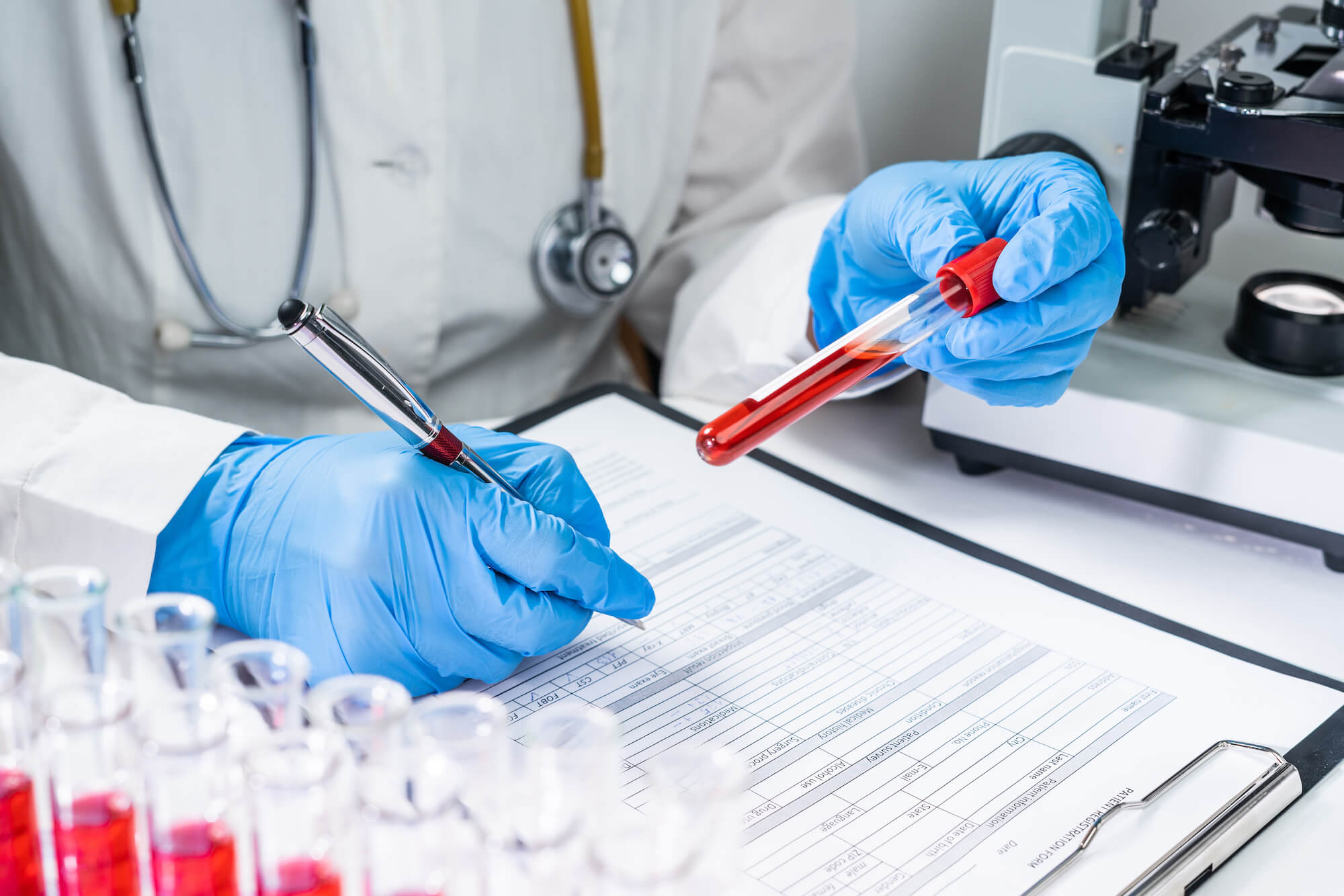What Your Blood Can Reveal: The Power of Blood Tests
From detecting illness to diagnosing disease, a blood test gives your doctor the perfect opportunity to obtain a clear picture of your health.
It can provide us with important details about your organs, their functions, diet, metabolism, and so much more.
Invest-Med’s medical-grade blood work focuses on overall health and areas of improvement. It also includes advanced testing for specific conditions, such as diabetes, cardiovascular health, and nutrition.
Our blood tests are done in your home, on your schedule, by our visiting nurse.
Every 24 hours, more than 20 Canadians die from diabetes-related complications.
Diabetes Canada, 2023
- Test : Blood Work
- Early Detection Of : Diabetes, Heart Disease, Blood Clotting Disorders, High Cholesterol, Immune System Infections

Blood Work
Blood tests are used to monitor your overall health or help diagnose a medical condition.
They measure or examine cells, chemicals, proteins, or other substances in the blood.
Blood testing, also known as blood work, is one of the most common types of lab tests. Blood work is often included as part of a regular checkup, or because you have certain symptoms.
There are many different types of blood tests. While some tests focus on your blood cells and platelets, others evaluate substances in your blood such as electrolytes, proteins and hormones.
Detecting and Monitoring Diseases and Conditions
Blood tests are performed to evaluate your overall health, as well as detect and monitor certain diseases and conditions.
Advanced blood testing for specific conditions include testing for diabetes, cardiovascular health, and nutrition.
Complete Blood Count (CBC)
Basic Metabolic Panel
Diabetes
Cardiovascular Health
Nutrition
- They count and measure your red blood cells, white blood cells, and platelets.
- They measure your hemoglobin levels.
- They measure variations in your red blood cells’ size and volume.
Complete blood count tests are usually done as part of an annual checkup, or to monitor your overall health.
- Liver and kidney health
- Blood sugar levels
- Blood protein levels
- Fluid and electrolyte balance
- Metabolism
It can also be used to monitor the side effects of certain medications.
Since symptoms of certain diabetes and prediabetes may come on more gradually, or may be difficult to detect, it is recommended for patients to get screened for diabetes through a blood test.
Doctors use a variety of tests to diagnose diabetes and prediabetes. Your doctor may recommend different tests depending on whether you have symptoms or not.
- Blood Glucose Test: Screens for diabetes. It measures the level of glucose (sugar) in your blood. It is mostly used to screen for Type 2 diabetes, which is a common condition.
- A1C Test: A blood test that shows your average blood sugar level for the past 2 to 3 months. It measures the percentage of blood sugar attached to hemoglobin, the oxygen-carrying protein in red blood cells.
Certain blood tests can evaluate your cardiovascular health by determining your risk of developing heart disease.
- A cardiac blood test can be performed if you are at risk of having a heart attack or developing heart disease.
- An arterial blood gas (ABG) test measures oxygen and carbon dioxide levels to diagnose acute heart failure and cardiac arrest.
Blood tests can be used to evaluate a person’s nutritional status, measuring the amounts of essential nutrients in the body to detect nutritional deficits, including vitamin deficiency.
An example would be a comprehensive nutrition panel, which measures levels of vitamins, minerals, enzymes, and other nutrients essential for our overall health and well-being.
Nutritional testing can help you identify any nutrients that you may not be getting enough of, and identify any you may be consuming too much of. It provides you with the nutritional information you need to optimize your health.
Benefits of Blood Work
Help Diagnose Health Issues
Blood work can help healthcare providers diagnose certain diseases and conditions. It aims to provide a clearer picture of the state of your health, clearing up any uncertainties you may have had about your health.
Blood work also helps diagnose bleeding or blood clotting disorders.
Monitor Chronic Diseases and Conditions
Blood testing can be used to monitor a chronic disease or condition, such as diabetes or high cholesterol. It can track changes over time and help you determine if your condition has improved, stayed the same, or worsened.
Blood testing can also be performed to find out if a specific treatment for a disease is working.
Check Health of Organs
Blood work is able to check how well your organs are functioning. These include your liver, kidneys, heart, and thyroid.
Blood work can also help determine if your immune system is having trouble fighting infections.

Don’t become a statistic.
Invest now in your future health and be fit for the long term.
How Blood Tests Work
Before the Procedure
During the Procedure
After the Procedure

Reasons to Get Blood Work Done
Monitors Your Overall Health
Screens for Possible Diseases
Helps Find a Diagnosis
Packages
Invest-Med offers thorough health packages designed to meet the individual needs of our patients.
You can choose between a risk-specific package or a comprehensive package to analyze your health and wellbeing.
Our health packages include rapid access to diagnostic testing using state-of-the-art technology, searching for 500+ diseases in the body, including cancer and heart disease.
Each package includes a comprehensive 1 hour physical exam and 1 hour medical review of results with recommendations to achieve optimal health.
Package costs will vary based on individual diagnostic test recommendations. Financing options are available.
Private MRI Health Packages
Full-Body MRI + Metabolic Blood Panel
Package starting at $5,699*
A Full-Body MRI proactively searches for 500 diseases lurking inside the body.
This package evaluates of overall metabolic efficiency by analyzing of a comprehensive range of biomarkers.
- Advanced lipid profiles
- Insulin resistance
- Indicators of inflammation
- Key measures of organ function
All Private MRI packages also include:
- Physician read results
- Long term plan of action
- Ongoing care with referrals
*Package cost will vary based on individual diagnostic test recommendations. Financing options are available.
Full-Body MRI + Cardiac Blood Panel
Package starting at $5,699*
A Full-Body MRI proactively scans the entire body to detect up to 500 hidden diseases.
A series of assessments used to evaluate cardiovascular health.
- Assessment of heart function indicators
- Measurement of cholesterol levels
- Measurement of triglycerides
- Evaluation of key inflammation markers
All Private MRI packages also include:
- Physician read results
- Long term plan of action
- Ongoing care with referrals
*Package cost will vary based on individual diagnostic test recommendations. Financing options are available.
Full-Body MRI + Hormone Blood Panel
Package starting at $5,699*
A Full-Body MRI scan can identify over 500 potential health conditions within the body.
A comprehensive evaluation of overall hormonal health and balance with an in-depth analysis of key hormones.
- Thyroid hormones
- Cortisol and other adrenal hormones
- Estrogen, progesterone, and testosterone
- Insulin levels
All Private MRI packages also include:
- Physician read results
- Long term plan of action
- Ongoing care with referrals
*Package cost will vary based on individual diagnostic test recommendations. Financing options are available.
Full-Body MRI + All 3 Blood Panels
Packages starting at $6,999*
All Private MRI packages also include:
- Physician read results
- Long term plan of action
- Ongoing care with referrals
*Package cost will vary based on individual diagnostic test recommendations. Financing options are available.
Risk-Specific Screening Packages
Cancer Screening Package
Mitigate your cancer risk with preventive screening.
- MRI
- DNA testing – 84 genes for cancer
- Mole mapping
- Advanced blood work
- CT scan
- Virtual colonoscopy
Proactive testing can detect changes in your body that could become cancer.
*Package prices range from $3,999 to $14,999.
Package cost will vary based on individual diagnostic test recommendations. Financing options are available.
Stroke Screening Package
Knowing your risk for stroke can save your life.
- MRA – Magnetic resonance angiography
- DNA testing – 83 genes for heart conditions
- Advanced blood work
- Carotid doppler ultrasound
- Echocardiogram
Detect your risk of stroke early, even before symptoms present themselves.
*Package prices range from $3,999 to $14,999.
Package cost will vary based on individual diagnostic test recommendations. Financing options are available.
Heart Disease Screening Package
Early screenings are essential for heart disease prevention.
- Coronary calcium score
- DNA testing – 83 genes for heart conditions
- Advanced blood work
- Exercise stress test
- Echocardiogram
- CT coronary angiography
Screening for cardiovascular risk factors before you develop heart disease, can help you prevent it.
*Package prices range from $3,999 to $14,999.
Package cost will vary based on individual diagnostic test recommendations. Financing options are available.
Comprehensive Screening Packages
Comprehensive Screening Package
Get the right screening tests at the right time.
- Whole body MRI
- Coronary calcium score
- DEXA scans
- Microbiome gut testing
- Genetic testing+
- Heart health workup
- Cancer risk review
- Mole mapping
- Screen for all material risks
Prevention is key to longevity, whether or not you are presenting symptoms or risk factors.
*Package prices range from $3,999 to $14,999.
Package cost will vary based on individual diagnostic test recommendations. Financing options are available.
Corporate Services
Please contact us for a custom corporate package. Specialized corporate rates available.
- Comprehensive, proactive health plans
- Customized screening tests
- Extensive medical risk assessments
- Preventive approach to healthcare
Proactively manage executive wellness.
FAQ
When should I have a blood test?
What should I do to prepare for my blood test?
Are there different ways to do blood tests?
All blood tests involve obtaining samples. Venipuncture, or extracting blood from a vein, is the most common way. Other procedures include:
- Finger stick: Your finger is pricked with a needle to collect a tiny amount of blood. The blood sample is then saved on a strip of paper that is sent to a lab for analysis.
- Heel stick: In some cases, the heel of your foot is pricked with a needle to obtain a blood sample.
- Arterial blood gas test: Your blood is taken from one of your arteries instead of a vein.
How much blood is taken during a blood test?
Do blood tests hurt?
To a certain extent they can, depending on the type of blood test you have. Tests that take blood from an artery typically cause more pain than those that take blood from a vein. A test with venipuncture may hurt if the nurse has difficulty inserting the needle into your vein. Let your doctor know if you have any discomfort, and they will try to find different ways to obtain samples of your blood.
I’m feeling anxious about having a blood test. What can I do to relax?
Feeling anxious about getting a blood test is perfectly normal. Here are some ways to cope with your stress:
- Looking away so you do not see the needle entering your arm
- Taking deep breaths as the needle is inserted into your arm
- Finding a way to distract yourself, such as counting down from 10
When will I know my test results?
Learn More
